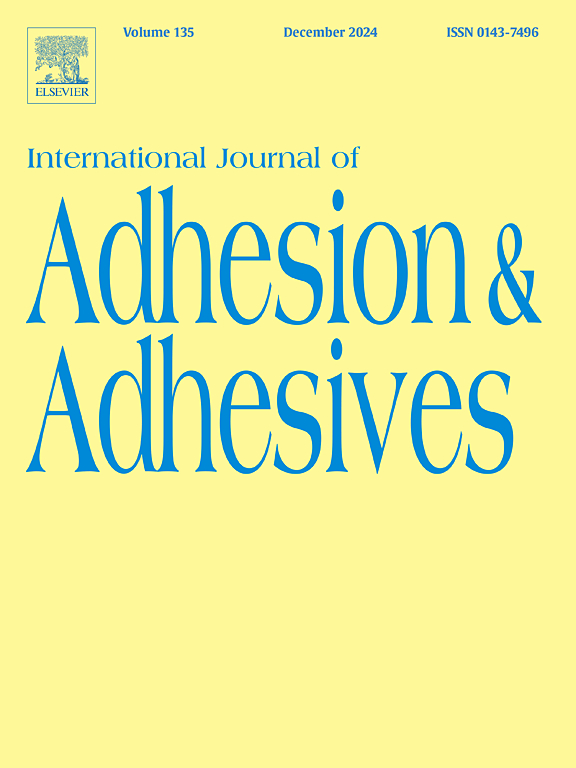Identification of mode I and III fracture toughness of a structural silicone sealant
IF 3.2
3区 材料科学
Q2 ENGINEERING, CHEMICAL
International Journal of Adhesion and Adhesives
Pub Date : 2024-11-10
DOI:10.1016/j.ijadhadh.2024.103881
引用次数: 0
Abstract
The present study focusses on the experimental determination of mode and fracture toughness for structural silicone sealants. Large deflections are explicitly considered in the theoretical framework employed for evaluating the experiments. Tests are performed with a structural silicone sealant manufactured in thin layers. Double cantilever beam specimen are loaded with out-of-plane shear to measure the mode fracture toughness of the adhesive. The methodology of the evaluation is validated numerically. The assumptions made in the development of the theoretical framework result in a maximum deviation between numerical results and the approximation formula of less than 10%. Additionally, double cantilever beam specimen are submitted to cleavage loading in order to determine the mode fracture toughness. We measure a mode fracture toughness of DOWSIL™ TSSA of . In case of out-of-plane shear loading, the fracture toughness is found to be . The outlined experiments are suitable for arbitrary nonlinear elastic materials undergoing large deflections during fracture toughness testing.
鉴定结构硅酮密封胶的 I 型和 III 型断裂韧性
本研究的重点是通过实验确定结构硅酮密封胶的模式 I 和模式 III 断裂韧性。在评估实验所采用的理论框架中明确考虑了大挠度。测试使用薄层结构硅酮密封胶进行。对双悬臂梁试样施加平面外剪切力,以测量粘合剂的模式 III 断裂韧性。评估方法经过数值验证。在制定理论框架时所作的假设使得数值结果与近似公式之间的最大偏差小于 10%。此外,还对双悬臂梁试样进行了劈裂加载,以确定模式 I 断裂韧性。我们测得 DOWSIL™ TSSA 的 I 模断裂韧性为 GIc=(3.64±0.91)N/mm 。在平面外剪切加载情况下,断裂韧性为 GIIIc=(7.03±0.94)N/mm 。概述的实验适用于在断裂韧性测试过程中发生大挠度的任意非线性弹性材料。
本文章由计算机程序翻译,如有差异,请以英文原文为准。
求助全文
约1分钟内获得全文
求助全文
来源期刊

International Journal of Adhesion and Adhesives
工程技术-材料科学:综合
CiteScore
6.90
自引率
8.80%
发文量
200
审稿时长
8.3 months
期刊介绍:
The International Journal of Adhesion and Adhesives draws together the many aspects of the science and technology of adhesive materials, from fundamental research and development work to industrial applications. Subject areas covered include: interfacial interactions, surface chemistry, methods of testing, accumulation of test data on physical and mechanical properties, environmental effects, new adhesive materials, sealants, design of bonded joints, and manufacturing technology.
 求助内容:
求助内容: 应助结果提醒方式:
应助结果提醒方式:


